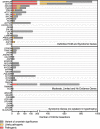Evaluating the Clinical Validity of Hypertrophic Cardiomyopathy Genes
- PMID: 30681346
- PMCID: PMC6410971
- DOI: 10.1161/CIRCGEN.119.002460
Evaluating the Clinical Validity of Hypertrophic Cardiomyopathy Genes
Abstract
Background: Genetic testing for families with hypertrophic cardiomyopathy (HCM) provides a significant opportunity to improve care. Recent trends to increase gene panel sizes often mean variants in genes with questionable association are reported to patients. Classification of HCM genes and variants is critical, as misclassification can lead to genetic misdiagnosis. We show the validity of previously reported HCM genes using an established method for evaluating gene-disease associations.
Methods: A systematic approach was used to assess the validity of reported gene-disease associations, including associations with isolated HCM and syndromes including left ventricular hypertrophy. Genes were categorized as having definitive, strong, moderate, limited, or no evidence of disease causation. We also reviewed current variant classifications for HCM in ClinVar, a publicly available variant resource.
Results: Fifty-seven genes were selected for curation based on their frequent inclusion in HCM testing and prior association reports. Of 33 HCM genes, only 8 (24%) were categorized as definitive ( MYBPC3, MYH7, TNNT2, TNNI3, TPM1, ACTC1, MYL2, and MYL3); 3 had moderate evidence ( CSRP3, TNNC1, and JPH2; 33%); and 22 (66%) had limited (n=16) or no evidence (n=6). There were 12 of 24 syndromic genes definitively associated with isolated left ventricular hypertrophy. Of 4191 HCM variants in ClinVar, 31% were in genes with limited or no evidence of disease association.
Conclusions: The majority of genes previously reported as causative of HCM and commonly included in diagnostic tests have limited or no evidence of disease association. Systematically curated HCM genes are essential to guide appropriate reporting of variants and ensure the best possible outcomes for HCM families.
Keywords: genetic testing; heart failure; syndrome; uncertainty.
Figures
References
-
- Gersh BJ, et al. American College of Cardiology Foundation/American Heart Association Task Force on Practice Guidelines. 2011 ACCF/AHA guideline for the diagnosis and treatment of hypertrophic cardiomyopathy: a report of the American College of Cardiology Foundation/American Heart Association Task Force on Practice Guidelines. Developed in collaboration with the American Association for Thoracic Surgery, American Society of Echocardiography, American Society of Nuclear Cardiology, Heart Failure Society of America, Heart Rhythm Society, Society for Cardiovascular Angiography and Interventions, and Society of Thoracic Surgeons. J Am Coll Cardiol. 2011;58:e212–e260. doi: 10.1016/j.jacc.2011.06.011. - PubMed
-
- Elliott PM, et al. 2014 ESC Guidelines on diagnosis and management of hypertrophic cardiomyopathy: the Task Force for the Diagnosis and Management of Hypertrophic Cardiomyopathy of the European Society of Cardiology (ESC). Eur Heart J. 2014;35:2733–2779. - PubMed
-
- Semsarian C, et al. New perspectives on the prevalence of hypertrophic cardiomyopathy. J Am Coll Cardiol. 2015;65:1249–1254. doi: 10.1016/j.jacc.2015.01.019. - PubMed
-
- Maron BJ, et al. Prevalence of hypertrophic cardiomyopathy in a general population of young adults. Echocardiographic analysis of 4111 subjects in the CARDIA Study. Coronary Artery Risk Development in (Young) Adults. Circulation. 1995;92:785–789. - PubMed
-
- Jarcho JA, et al. Mapping a gene for familial hypertrophic cardiomyopathy to chromosome 14q1. N Engl J Med. 1989;321:1372–1378. doi: 10.1056/NEJM198911163212005. - PubMed
Publication types
MeSH terms
Grants and funding
LinkOut - more resources
Full Text Sources
Other Literature Sources
Research Materials
Miscellaneous



